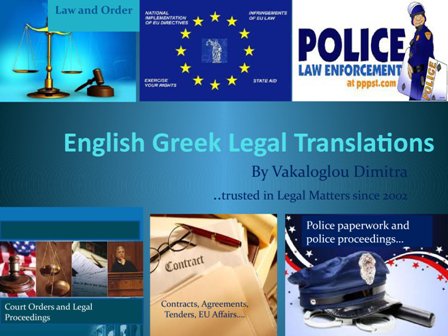Legal Translations
 I am armed with an in-depth knowledge of legal terminology and a familiarity with all kinds of legal documents!
I am armed with an in-depth knowledge of legal terminology and a familiarity with all kinds of legal documents!

With my Legal Translation experience since 2002 working as a freelancer at a lawyer's office along with my educational background in Police and Law and Order Proceedings, I can provide you with the highest-quality legal support in the Translation Industry! My cooperation with licensed attorneys and law enforcement professionals, have given me particular insight and expertise in the Legal Field.
Legal translation is the translation of texts within the field of law. As law is a culture-dependent subject field, legal translation is not a simple task.
Only professional translators specializing in legal translation should translate legal documents and scholarly writings. The mistranslation of a passage in a contract, for example, could lead to lawsuits and loss of money.
When translating a text within the field of law, the translator should keep the following in mind. The legal system of the source text (ST) is structured in a way that suits that culture and this is reflected in the legal language; similarly, the target text (TT) is to be read by someone who is familiar with the other legal system (corresponding to the jurisdiction for which TT is prepared) and its language. Most forms of legal writing and contracts in particular, seek to establish clearly defined rights and duties for certain individuals. It is essential to ensure precise correspondence of these rights and duties in the source text and in the translation. Legal translation may also involve, Certificates of Accuracy, Witness Statements, Depositions, Trusts, Wills, Articles of Incorporation, Litigation Documents, Immigration Documents, Property/Exhibit Labels and in some cases attendance in court by the translator(s).
Apart from terminological lacunae or lexical gaps, the translator may focus on the following aspects. Textual conventions in the source language are often culture-dependent and may not correspond to conventions in the target culture (see e.g. Nielsen 2010). Linguistic structures that are often found in the source language may have no direct equivalent structures in the target language. The translator therefore, has to be guided by certain standards of linguistic, social and cultural equivalence between the language used in the source text (ST) to produce a text (TT) in the target language. Those standards correspond to a variety of different principles defined as different approaches to translation in Translation Theory. Each of the standards sets a certain priority among the elements of ST to be preserved in TT. For example, following the functional approach, translators try to find target language structures with the same functions as those in the source language thus value the functionality of a text fragment in ST more than, say, the meanings of specific words in ST and the order in which they appear there. Note that different approaches to translation should not be confused with different approaches to Translation Theory. The former are the standards utilized by translators in their trade while the latter are just different paradigms used in developing Translation Theory.
There is confusion, between the names of some of the translation standards used in legal practice. Not many lawyers and judges are familiar with the terminology used in Translation Theory and they often ask court interpreters and translators to provide verbatim translation. They often view this term as a clear standard of quality that they desire in TT. However, usually it does not mean to provide verbatim translation in the meaning of the standard described in Translation Theory with which they are not familiar. Their use of this term is based on a layperson's misconception that an accurate translation is achieved simply when "the correct" words of the target language are substituted for the corresponding words of ST. In reality, they just want to have a faithful and fluent translation of ST having no doubt that a good translator will provide it. They do not realize that word-by-word translations could sound as complete nonsense in the target language, and usually have no idea of different professional translation standards. Many translators would probably choose to adhere to the standard that they themselves find more appropriate in a given situation based on their experience rather than to attempt to educate the court personnel.
Translators of legal texts often consult law dictionaries, especially bilingual law dictionaries. Care should be taken, as some bilingual law dictionaries are of poor quality and their use may lead to mistranslation.
DIMITRA VAKALOGLOU
TRUSTED IN LEGAL MATTERS SINCE 2002
.jpg)

.jpg)